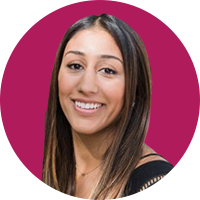For college students, graduation is not only a celebration of years of hard work, but also a time to start thinking about the future. Along with finding that first job, there’s one major moment looming for new accounting graduates: passing the CPA Exam. Passing the CPA Exam takes hard work and determination, so planning how to start tackling the exam can be just as important as actually studying for it.
Becker wants to make sure that you plot the best course to find success on the big exam day. With that in mind, we’ve created a basic CPA Exam schedule and timeline to help you plan your path forward and alleviate unnecessary stress along the way.

The path to CPA Exam success: your CPA Exam schedule
1. Getting started with your CPA study plan
While passing the CPA Exam is the ultimate goal, it’s important to remember that there are a number of hurdles to clear between now and exam day. First things first: you need to determine your eligibility. Each state or jurisdiction has specific CPA requirements regarding education stipulations, experience, and residency, so you'll want to check those before applying to sit for the exam.
Once you submit the required documentation, your application will be verified for eligibility and you’ll receive a Notice to Schedule (NTS). Your NTS will indicate the first and last days you’re eligible to take the CPA Exam and is valid for six months. Once you've received your NTS, you're better able to define your CPA Exam schedule for studying and taking the exam.
2. Understanding the CPA Exam
Administered by the AICPA®, the CPA Exam is split into four sections to test the minimum knowledge and skills required of a CPA. The CPA exam content is frequently updated to reflect the most relevant information for newly licensed CPAs.
You'll need to pass four sections of the CPA Exam, including three Core Exams that all candidates must take:
- Auditing and Attestation (AUD)
- Financial Accounting and Reporting (FAR)
- Taxation and Regulation (REG)
You'll also need to pass one of three Discipline exams:
- Business Analysis and Reporting (BAR)
- Information Systems and Controls (ISC)
- Tax Compliance and Planning (TCP)
Once you understand the scope of the exam material, you’ll be able to hone in on what will be the easiest or most difficult sections for you and plan accordingly. Becker can help choose the best order to take the CPA Exams.
Not sure which CPA Exam Discipline is right for you? Take our quiz and find out!
3. Organizing your CPA Exam study schedule
Passing the CPA Exam requires a great deal of time and effort, so it’s important to allow for adequate study time of the in-depth material. Once you pass your first exam, you have a specific time period to pass all the exams. Nearly all states have adopted a 30-month timeline, but it's important to check with your Board of Accountancy to be sure.
By planning your CPA test schedule ahead of time, you can make sure you’re best prepared to pass the exam with flying colors. Most candidates spend between 400 to 600 hours of time studying for the entire exam, at between 10 and 20 hours per week. This can be a substantial time commitment on top of your other obligations. You’ll want to make sure you leave room for lectures, practice questions, mock exams, and any other kinds of studying you choose to partake in.
Becker's customizable study planner helps you stay on track with your CPA Exam study schedule. It's included in your learning dashboard, and personalizes your study plan based on your exam date and how many hours you want to study per week. Then it guides you with specific goals of what to study and when, so you can be sure that you're ready on exam day.
PRO TIP: Plan your time strategically
Also remember to consider the outside influences that could affect your CPA study schedule. Ask yourself a few questions: Are you starting a new job soon? Is it your firm’s busy season? Do you have any events coming up in your personal life (weddings, vacations, etc.)? You need to take these things into account as you map out your CPA study plan.
4. Scheduling the CPA Exam
The four parts of the exam are not equal when it comes to difficulty, and some exams will build on knowledge you studied for in previous sections. So, it's important to create a schedule and an outline of how to schedule your exams. There are two main schools of thought when it comes to scheduling the order of your CPA Exams:
Hardest first
This approach entails taking the section that will be the most difficult for you first. Remember, your 18-month clock doesn’t start until you pass your first section, so if you don’t do well your first time, there is no rush to retake the test. Plus, passing your most difficult section first gives you a big confidence boost heading into sections you know better.
Best foot forward
The other strategy advises that you start with the section you’re most comfortable with. It’s great to start off the exam on a high note with material you know best while you gain experience in exam format. If possible, it may make sense for you to start with the exam section that’s the most recent in memory.
Becker's recommendation
In general, Becker recommends starting with FAR as this exam covers the foundational accounting topics that you'll need to understand for success on the other exam sections. Similarly, if you’re starting in an audit role post-CPA Exam and want to choose ISC as your Discipline, you may want to save AUD and ISC for last, so that you’re ready to dive in headfirst with your AUD knowledge.
That said, FAR is one of the harder sections, with a CPA Exam pass rate lower than the other Core sections. If you know that you'll need a boost of confidence and want to start the CPA Exam with an easier section you know you'll pass, you may choose to begin with REG (another Core section that has a much higher pass rate than FAR).
To eliminate doubt and confusion about how to schedule your exams, start by choosing which of the three Discipline sections you want to take by answering these questions:
- What do I know?
- What do I like?
- What do I want to do professionally?
The answers to these questions will help guide your choice of Discipline section, which will then help you narrow down your exam order based on your strengths, career goals, and the Core section that relates to your chosen Discipline.
PRO TIP: Account for the unexpected
You may want to plan for things not going your way when figuring out your CPA Exam schedule and timeline. Whether it’s not passing a tricky section, an extra-heavy busy season or unforeseen obligations, a number of factors can impede your CPA Exam progress, so always allot more time than you think you’ll need to clear the exams.
We do want to note that things like inclement weather can force exam center closures. Although these factors are out of your control, you can make sure to be proactive in planning your CPA Exam schedule in case one or more of these situations occur. Be sure not to wait until the last minute to schedule your CPA Exams!
5. Taking the exam
You must pass the three Core exams and one Discipline exam in at least 30 months with a minimum score of 75. Your “clock” begins when you pass the first exam section. Remember that the content may change between exams, so it’s important to make sure you’re using the most up-to-date material to prep. (If you're using Becker CPA Exam Review, don't worry! We do that part for you, making sure our curriculum is 100% accurate and up-to-date with AICPA guidelines.)
6. Applying for your license
Once you pass the CPA Exam (congrats!), it’s time to apply for your CPA license. Before you do, make sure you meet your State Board of Accountancy's CPA requirements to become a fully licensed CPA.
Once you’re a fully licensed CPA, remember that you’ll need to maintain your CPE credits and other professional obligations based on your state or jurisdiction.
Complete your CPA study plan with Becker
We know the timeline for taking and passing the CPA Exam can seem a bit overwhelming. But, Becker offers the learning, support, and guidance you need to achieve your goals. With comprehensive materials, over 4,000 multiple choice questions to test your knowledge, and an experienced team of instructors, you can feel confident that we can help you get Exam Day Readysm.
Get a 14-day free trial of our leading CPA Exam review to see if it's right for you!








